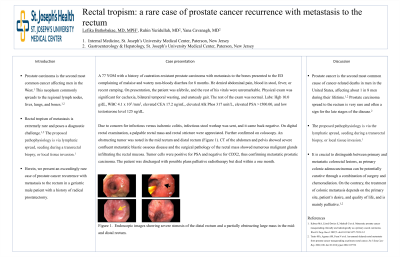Monday Poster Session
Category: Colon
P1660 - Rectal Tropism: A Unique Case of Prostate Cancer With Metastasis to the Rectum
Monday, October 23, 2023
10:30 AM - 4:15 PM PT
Location: Exhibit Hall

Has Audio

Lefika Bathobakae, MD, MPH
St. Joseph's University Medical Center
Paterson, NJ
Presenting Author(s)
Lefika Bathobakae, MD, MPH, Aakash Trivedi, DO, Pasha Shenasan, MD, Ruhin Yuridullah, MD
St. Joseph's University Medical Center, Paterson, NJ
Introduction: Prostate carcinoma is the second most common cancer affecting males in the West. This malignancy commonly spreads to the regional lymph nodes, liver, lungs, and bones. Rectal tropism of metastasis is extremely rare and poses a diagnostic challenge. Herein, we present an exceedingly rare case of prostate cancer with metastasis to the rectum in a geriatric male patient with a history of radical prostatectomy.
Case Description/Methods: A 77-year-old male with a history of castration-resistant prostate carcinoma with metastasis to the bones presented to the ED complaining of malaise and watery, non-bloody diarrhea for 8 months. He denied abdominal pain, blood in stool, fever, or recent camping. On presentation, the patient was afebrile, and the rest of his vitals were unremarkable. Physical exam was significant for cachexia, bilateral temporal wasting, and unsteady gait. The rest of the exam was normal. Labs: Hgb 10.0 g/dL, WBC 4.1 x 103 /mm3, elevated CEA 17.2 ng/mL, elevated Alk Phos 317 unit/L, elevated PSA >1500.00, and low testosterone level 125 ng/dL. Due to concern for infectious versus ischemic colitis, infectious stool workup was sent, and it came back negative. On digital rectal examination, a palpable rectal mass and rectal stricture were appreciated. Further confirmed on coloscopy. An obstructing tumor was noted in the mid-rectum and distal rectum. CT of the abdomen and pelvis showed severe confluent metastatic blastic osseous disease, and the surgical pathology of the rectal mass showed numerous malignant glands infiltrating the rectal mucosa. Tumor cells were positive for PSA and negative for CDX2, thus confirming metastatic prostatic carcinoma. The patient was discharged with possible plans for palliative radiotherapy.
Discussion: Prostate cancer is the second most common cause of cancer-related deaths in men in the United States, affecting about 1 in 8 men during their lifetime. Prostate carcinoma spread to the rectum is very rare and often a sign of the late stages of the disease. The proposed pathophysiology is via the lymphatic spread, seeding during a transrectal biopsy, or local tissue invasion. It is crucial to distinguish between primary and metastatic colorectal lesions, as primary colonic adenocarcinomas can be potentially curative through surgery and chemoradiation. On the contrary, treating colonic metastasis depends on the primary site, patient’s desire, and quality of life and is mainly palliative.

Disclosures:
Lefika Bathobakae, MD, MPH, Aakash Trivedi, DO, Pasha Shenasan, MD, Ruhin Yuridullah, MD. P1660 - Rectal Tropism: A Unique Case of Prostate Cancer With Metastasis to the Rectum, ACG 2023 Annual Scientific Meeting Abstracts. Vancouver, BC, Canada: American College of Gastroenterology.
St. Joseph's University Medical Center, Paterson, NJ
Introduction: Prostate carcinoma is the second most common cancer affecting males in the West. This malignancy commonly spreads to the regional lymph nodes, liver, lungs, and bones. Rectal tropism of metastasis is extremely rare and poses a diagnostic challenge. Herein, we present an exceedingly rare case of prostate cancer with metastasis to the rectum in a geriatric male patient with a history of radical prostatectomy.
Case Description/Methods: A 77-year-old male with a history of castration-resistant prostate carcinoma with metastasis to the bones presented to the ED complaining of malaise and watery, non-bloody diarrhea for 8 months. He denied abdominal pain, blood in stool, fever, or recent camping. On presentation, the patient was afebrile, and the rest of his vitals were unremarkable. Physical exam was significant for cachexia, bilateral temporal wasting, and unsteady gait. The rest of the exam was normal. Labs: Hgb 10.0 g/dL, WBC 4.1 x 103 /mm3, elevated CEA 17.2 ng/mL, elevated Alk Phos 317 unit/L, elevated PSA >1500.00, and low testosterone level 125 ng/dL. Due to concern for infectious versus ischemic colitis, infectious stool workup was sent, and it came back negative. On digital rectal examination, a palpable rectal mass and rectal stricture were appreciated. Further confirmed on coloscopy. An obstructing tumor was noted in the mid-rectum and distal rectum. CT of the abdomen and pelvis showed severe confluent metastatic blastic osseous disease, and the surgical pathology of the rectal mass showed numerous malignant glands infiltrating the rectal mucosa. Tumor cells were positive for PSA and negative for CDX2, thus confirming metastatic prostatic carcinoma. The patient was discharged with possible plans for palliative radiotherapy.
Discussion: Prostate cancer is the second most common cause of cancer-related deaths in men in the United States, affecting about 1 in 8 men during their lifetime. Prostate carcinoma spread to the rectum is very rare and often a sign of the late stages of the disease. The proposed pathophysiology is via the lymphatic spread, seeding during a transrectal biopsy, or local tissue invasion. It is crucial to distinguish between primary and metastatic colorectal lesions, as primary colonic adenocarcinomas can be potentially curative through surgery and chemoradiation. On the contrary, treating colonic metastasis depends on the primary site, patient’s desire, and quality of life and is mainly palliative.

Figure: Figure 1.0: endoscopic images showing severe stenosis of the distal rectum (yellow arrow) and an infiltrative and sessile partially obstructing large mass in the mid-and distal rectum (black arrow).
Disclosures:
Lefika Bathobakae indicated no relevant financial relationships.
Aakash Trivedi indicated no relevant financial relationships.
Pasha Shenasan indicated no relevant financial relationships.
Ruhin Yuridullah indicated no relevant financial relationships.
Lefika Bathobakae, MD, MPH, Aakash Trivedi, DO, Pasha Shenasan, MD, Ruhin Yuridullah, MD. P1660 - Rectal Tropism: A Unique Case of Prostate Cancer With Metastasis to the Rectum, ACG 2023 Annual Scientific Meeting Abstracts. Vancouver, BC, Canada: American College of Gastroenterology.
